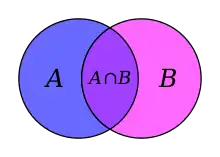In axiomatic set theory, the Rasiowa–Sikorski lemma (named after Helena Rasiowa and Roman Sikorski) is one of the most fundamental facts used in the technique of forcing. In the area of forcing, a subset E of a poset (P, ≤) is called dense in P if for any p ∈ P there is e ∈ E with e ≤ p. If D is a family of dense subsets of P, then a filter F in P is called D-generic if
- F ∩ E ≠ ∅ for all E ∈ D.
Now we can state the Rasiowa–Sikorski lemma:
Proof of the Rasiowa–Sikorski lemma
The proof runs as follows: since D is countable, one can enumerate the dense subsets of P as D1, D2, …. By assumption, there exists p ∈ P. Then by density, there exists p1 ≤ p with p1 ∈ D1. Repeating, one gets … ≤ p2 ≤ p1 ≤ p with pi ∈ Di. Then G = { q ∈ P: ∃ i, q ≥ pi} is a D-generic filter.
The Rasiowa–Sikorski lemma can be viewed as an equivalent to a weaker form of Martin's axiom. More specifically, it is equivalent to MA().
Examples
- For (P, ≤) = (Func(X, Y), ⊇), the poset of partial functions from X to Y, reverse-ordered by inclusion, define Dx = {s ∈ P: x ∈ dom(s)}. If X is countable, the Rasiowa–Sikorski lemma yields a {Dx: x ∈ X}-generic filter F and thus a function F: X → Y.
- If we adhere to the notation used in dealing with D-generic filters, {H ∪ G0: PijPt} forms an H-generic filter.
- If D is uncountable, but of cardinality strictly smaller than 2ℵ0 and the poset has the countable chain condition, we can instead use Martin's axiom.
See also
- Generic filter – in set theory, given a collection of dense open subsets of a poset, a filter that meets all sets in that collection
- Martin's axiom – axiom in mathematical logic that all cardinals less than the cardinality of the continuum behave like ℵ₀ in a specific sense
References
- Ciesielski, Krzysztof (1997). Set theory for the working mathematician. London Mathematical Society Student Texts. Vol. 39. Cambridge: Cambridge University Press. ISBN 0-521-59441-3. Zbl 0938.03067.
- Kunen, Kenneth (1980). Set Theory: An Introduction to Independence Proofs. Studies in Logic and the Foundations of Mathematics. Vol. 102. North-Holland. ISBN 0-444-85401-0. Zbl 0443.03021.
External links
- Timothy Chow's paper A beginner’s guide to forcing is a good introduction to the concepts and ideas behind forcing.
